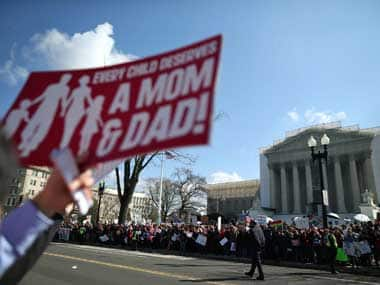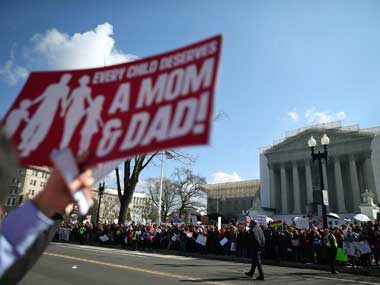New York: As thousands of demonstrators on both sides of America’s gay rights divide rallied on Tuesday outside the Supreme Court, justices heard arguments on whether to let stand a California ban on same-sex marriage. Tuesday’s intense dissection of Proposition 8 turned at one point to children with a searching question from Justice Anthony Kennedy, assumed to be the court’s swing vote on gay marriage. During early questioning in the hour-long argument, Justice Kennedy suggested there “is an immediate legal injury” in not permitting same-sex marriage to some 40,000 children in California who live with same-sex parents that “want their parents to have full recognition and full status.” “The voice of those children is important in this case, don’t you think?” Justice Kennedy asked Chuck Cooper, the lawyer defending the Proposition 8 gay-marriage ban. [caption id=“attachment_676703” align=“alignleft” width=“380”]  A 2000 US Census showed 33 percent of female same-sex couples and 22 percent of male same-sex couples reported at least one child under 18 living in the home. Getty Images[/caption] Justice Antonin Scalia, who since his appointment to the Supreme Court in 1986, has delivered some of the most controversial statements on gay rights, immediately leaped in by saying there is “considerable disagreement” over the effects on children of having same-sex parents. “Do you know the answer to that, whether it harms or helps the child?” Scalia said, suggesting it would be premature for the court to set a nationwide rule. “I take no position on whether it’s harmful or not.” A 2000 US Census showed 33 percent of female same-sex couples and 22 percent of male same-sex couples reported at least one child under 18 living in the home. In 2004, the American Psychological Association passed a policy resolution saying “there is no scientific evidence that parenting effectiveness is related to parental sexual orientation” and that lesbian and gay parents “are as likely as heterosexual parents to provide supportive and healthy environments” for their children. Kate Kendell, the executive director of the National Center for Lesbian Rights, who attended Tuesday’s hearing told The Wall Street Journal that while kids are doing fine being raised by same-sex couples who aren’t married, they’re doing so despite challenges they face: “The stability and security of marriage provides a safety net for families.” The California case has the potential to produce America’s biggest civil rights ruling in decades. But so far none of the justices have indicated support for the Obama administration’s favored solution, which would strike down Proposition 8 and require the other eight states that already recognize civil unions or domestic partnerships to allow gays and lesbians to marry. President Obama declared support for same-sex marriage last year and he championed gay rights at his inauguration in January. The case comes as public support for gay marriage hits record levels. Nine states and the District of Columbia now let gay couples marry. Forty US states don’t allow gay marriage. Cooper, facing a barrage of questions mostly from the Supreme Court’s liberal wing, called California’s law the equivalent of a “pause button.” Solicitor General Donald Verrilli, arguing on behalf of the Obama administration in support of striking down the law, said the California ban was not a “pause button” but a “delete button.” The Supreme Court has a Spectrum of Options. On Tuesday, while the justices considered California’s Proposition 8, a 2008 voter initiative amending the state constitution to restrict marriage to a man and a woman. On Wednesday, arguments will shift to the Defense of Marriage Act (DOMA), which defines marriage as a heterosexual institution, barring legally married gay couples from claiming the federal benefits available to other married couples. The two California gay and lesbian couples challenging the voter-approved ban on same-sex marriage are also urging the justices to strike down not just the California provision, but constitutional amendments and statutes in every state that define marriage as the union of a man and a woman. The high court, which will rule by June, has several options. If the case were dismissed on the theory that the grant of review was a mistake, it would mean that the Ninth Circuit’s California-only decision would become fully effective and it would remove the temporary order blocking marriages and same-sex couples could resume getting married in California. In another scenario, the justices could issue a broader ruling that would apply to California and eight other states: Colorado, Delaware, Hawaii, Illinois, Nevada, New Jersey, Oregon and Rhode Island. In those states, gay couples may join in civil unions or become domestic partners and have all the benefits of marriage but cannot be married. One other possibility is that the justices could reinstate California’s ban and leave each state to make its own decision about letting gays marry. Or it could announce a constitutional right to gay marriage nationwide.
A 2000 US Census showed 33 percent of female same-sex couples and 22 percent of male same-sex couples reported at least one child under 18 living in the home.
Advertisement
End of Article


)

)
)
)
)
)
)
)
)



